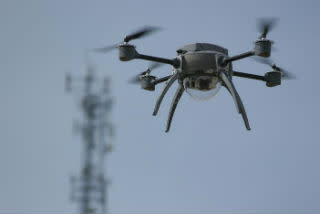Scholars and regulators grapple with the future of drones

An open letter sent from college and university professors to the Federal Aviation Administration criticizes the agency’s policy governing commercial drone use.
Sent in response to the FAA’s significant restrictions on drone use, the letter states that “free and open access to [drone] technology is absolutely essential to our nation’s continued leadership in aviation, to our future economy and to our long-term security.”
The FAA asserts that drone use falls under its stated authority over “any contrivance invented, used, or designed to navigate, or fly in, the air.” As such, the agency has banned commercial drones in all but a few cases until the agency can establish viable regulations. In the meantime, government entities—such as police departments and public universities—are eligible to apply for permission from the FAA to use drones.
Yet in a further complication, a National Transportation Safety Board administrative judge has ruled that the commercial drone ban is not enforceable. The FAA is pursuing an appeal.
In 2012, Congress tasked the FAA with safely integrating drones into U.S. airspace by September 2015. This involves creating air traffic regulations similar to, and able to coexist with, airplane and helicopter regulations. However, the FAA is not addressing the kind of data and photos that drones would be able to collect.
Instead, President Obama will soon issue an executive order tasking the Commerce Department’s National Telecommunications and Information Administration with filling in the gaps. The NTIA will likely only address privacy concerns for private drones, however.
For its part, the Supreme Court has not yet ruled whether or not data collected by an aerial drone conducting surveillance can be considered a search, in the case of government drones, or a trespass, in the case of private drones. In general, violations of privacy are calibrated to reasonable expectations.
For example, the Court ruled in three separate cases that the information collected by law enforcement aircraft—flying within FAA regulated airspace and only surveying open areas—did not violate the Fourth Amendment. Any private citizen, in a private aircraft, flying in accordance with FAA regulations could have observed the same thing.
Yet these cases did not address drones specifically. Unlike traditional aircraft, drones can easily be operated within the much lower altitude zone of unregulated airspace, and can also carry more advanced and invasive surveillance technology. It remains to be seen whether these circumstances would constitute a violation of the Fourth Amendment.
In an effort to head off the issue, several states have already passed or proposed laws to regulate drone use. Most of them, however, only deal with government use—hence the need for the NTIA’s regulations on private use.
At least a dozen states have passed laws requiring law enforcement agencies to procure a warrant before using drones. Those laws include exceptions to the process, including imminent physical harm, terrorist threats, missing person searches, and search-and-rescue operations. Some of these states also require that the information collected by drones be deleted after a certain period of time, unless there is a pending trial or investigation.
Idaho and Texas have more expansive drone laws. These two states have statutory regulations on commercial use drones as well as those used by the government. They also allow for the regulated private use of drones in certain private sector industries, such as real estate, oil drilling, agriculture, and utility maintenance.
Nonetheless, with the FAA and NTIA working on regulations to address airspace and privacy concerns, it remains to be seen how the future of drone use will evolve.
Andrew Lowy is an intern at the National Constitution Center.
Recent Stories on Constitution Daily

